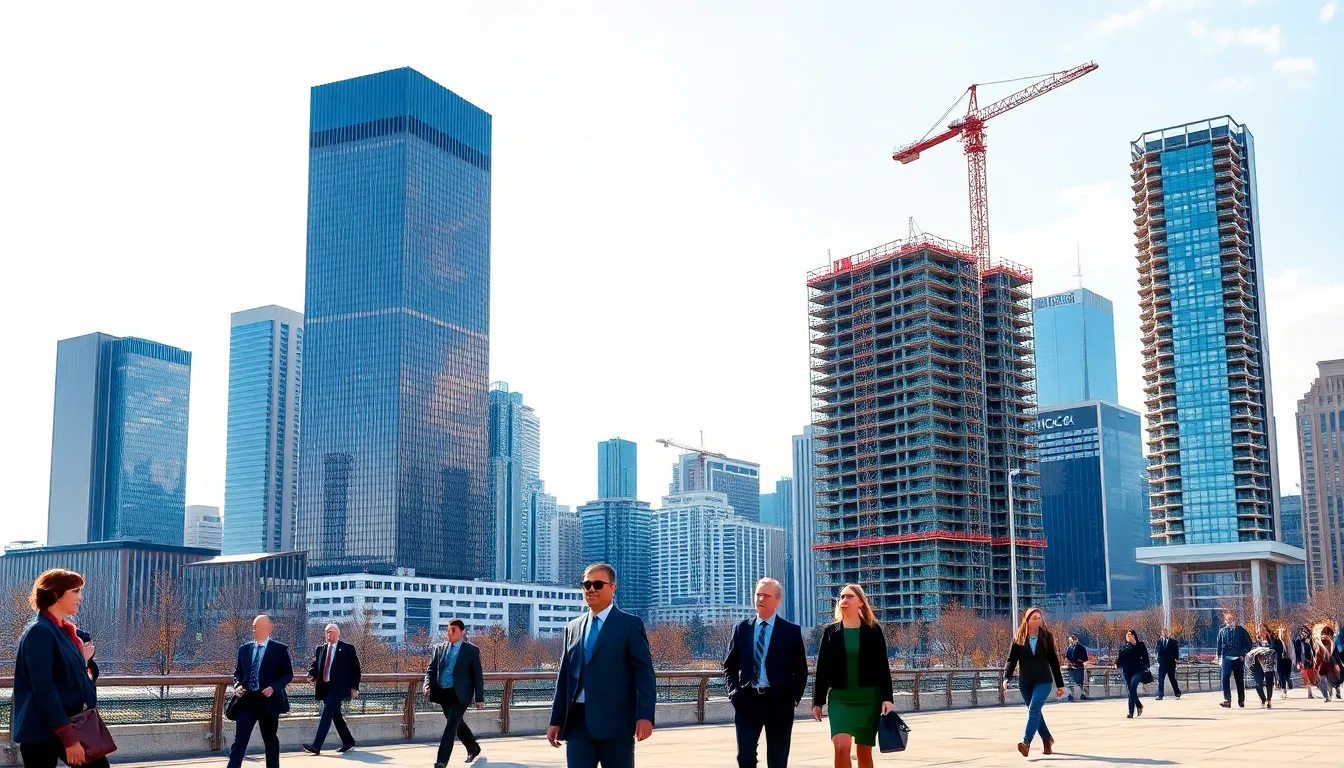Table of Contents
ToggleIn the bustling heart of Chicago, the commercial real estate scene is hotter than a deep-dish pizza fresh out of the oven. Investors and entrepreneurs alike are keeping a keen eye on the latest trends, market shifts, and opportunities that could turn a simple storefront into a goldmine. With the Windy City’s skyline constantly evolving, there’s never been a better time to dive into the world of commercial properties.
From high-rises that scrape the clouds to cozy shops in vibrant neighborhoods, the Chicago commercial real estate market is a treasure trove of potential. Whether you’re a seasoned investor or just dipping your toes in, staying updated on the latest news is crucial. So grab your hard hat and get ready to explore the dynamic landscape that’s shaping the future of business in this iconic city.
Overview of Chicago Commercial Real Estate Market
Chicago’s commercial real estate market continues to thrive, presenting ample opportunities for investors and business owners. Key trends and developments shape the landscape, reflecting the city’s robust economic growth and evolving needs.
Current Trends and Developments
In 2023, a notable shift toward sustainable building practices gains momentum. Developers increasingly prioritize energy-efficient designs and environmentally friendly materials. Flexible workspaces become more prevalent, catering to changing preferences among companies and their employees. Moreover, downtown areas witness a resurgence as retail and office spaces adapt to hybrid work models. Investment in mixed-use developments rises as demand for residential and commercial properties intertwine. Overall, adaptive reuse of older buildings sees increased interest, transforming them into modern spaces that serve diverse functions.
Key Players and Stakeholders
Several influential entities shape Chicago’s commercial real estate market. Notable real estate firms like CBRE and JLL lead property management and investment services. Local government agencies collaborate with private developers, ensuring alignment with urban planning initiatives. Financial institutions play a significant role, providing capital for major projects. In addition, real estate investment trusts (REITs) drive investment strategies, targeting high-potential areas. Local chambers of commerce promote business growth, helping entrepreneurs navigate opportunities within the market. Collectively, these stakeholders contribute to a dynamic and competitive commercial real estate environment in Chicago.
Recent News Highlights


Chicago’s commercial real estate market remains vibrant with notable activities. Investors and developers continuously adapt to emerging trends, ensuring growth amidst evolving landscape changes.
Major Transactions and Deals
In recent weeks, several significant deals shaped the market. A downtown office tower sold for $200 million, indicating strong demand for prime locations. A local developer acquired a mixed-use property for $45 million, highlighting interest in diversifying offerings. Notably, a technology company signed a long-term lease for 100,000 square feet in a newly renovated building, showcasing appetite for modern office spaces. With these transactions, stakeholders signal confidence in Chicago’s economic recovery.
Upcoming Projects and Developments
Numerous projects are set to transform the city’s skyline. A 20-story residential tower is slated for completion in early 2024, aiming to provide 250 apartments close to public transport. Additionally, plans for a major retail development in the South Loop area will bring over 150,000 square feet of shopping and dining options. Another noteworthy initiative involves converting an historic building into trendy office spaces, expected to retain its architectural character while modernizing for new tenants. These developments reflect ongoing commitment to enhancing urban living and working environments.
Market Comparisons
The commercial real estate market in Chicago stands out among major cities, driven by key trends. Strong demand for flexible workspaces and mixed-use developments sets Chicago apart from cities like New York and San Francisco. Notably, Chicago attracts investors seeking affordable properties relative to other metropolitan areas. Accessibility to diverse transportation options enhances its appeal, drawing businesses searching for strategic locations. Furthermore, the city boasts a growing tech hub, inviting startups and established firms alike.
Economic factors significantly shape the commercial real estate landscape. Interest rates and inflation have a direct impact on investment strategies. As of late 2023, rising interest rates have led to cautious decision-making among investors, with many focusing on high-potential areas. Job growth rates in Chicago support demand for office and retail spaces as new industries emerge. The city’s economic recovery demonstrates resilience, indicating a supportive environment for further development. Developers continue to adapt their strategies, addressing evolving market needs while capitalizing on opportunities for growth.
Future Outlook
The future of Chicago’s commercial real estate market looks promising, driven by evolving trends and strategic developments.
Predictions for the Chicago Market
Increased demand for flexible workspaces continues to define the trajectory of Chicago’s market. Developers focus on creating environments that meet the needs of hybrid work models. A surge in mixed-use properties appears likely, enriching urban landscapes with vibrant community spaces. Analysts predict growth in areas with strong transportation links, which appeal to both businesses and residents. As technology firms expand, a sense of optimism surrounds new office developments that cater to modern requirements.
Potential Challenges and Opportunities
Rising interest rates present challenges for investors evaluating financing options. The potential for economic fluctuations could influence decision-making, prompting caution among developers. Nonetheless, opportunities arise from adapting existing properties to suit contemporary usage needs. Chicago’s unique positioning enables it to attract diverse investments, particularly in areas experiencing revitalization. Job growth bolsters demand for office and retail spaces, fostering an environment conducive to innovation and expansion.
Chicago’s commercial real estate market is poised for continued growth and innovation. With a focus on sustainability and flexible workspaces, it reflects the evolving needs of businesses and residents alike. The ongoing investment in mixed-use developments and adaptive reuse projects showcases the city’s commitment to enhancing urban living.
As key players navigate this dynamic landscape, opportunities abound for investors and entrepreneurs willing to engage. While challenges like rising interest rates exist, the overall outlook remains optimistic. Chicago’s diverse offerings and strategic developments position it as a prime location for those looking to capitalize on the commercial real estate sector. The future holds promise for a vibrant and resilient market.



